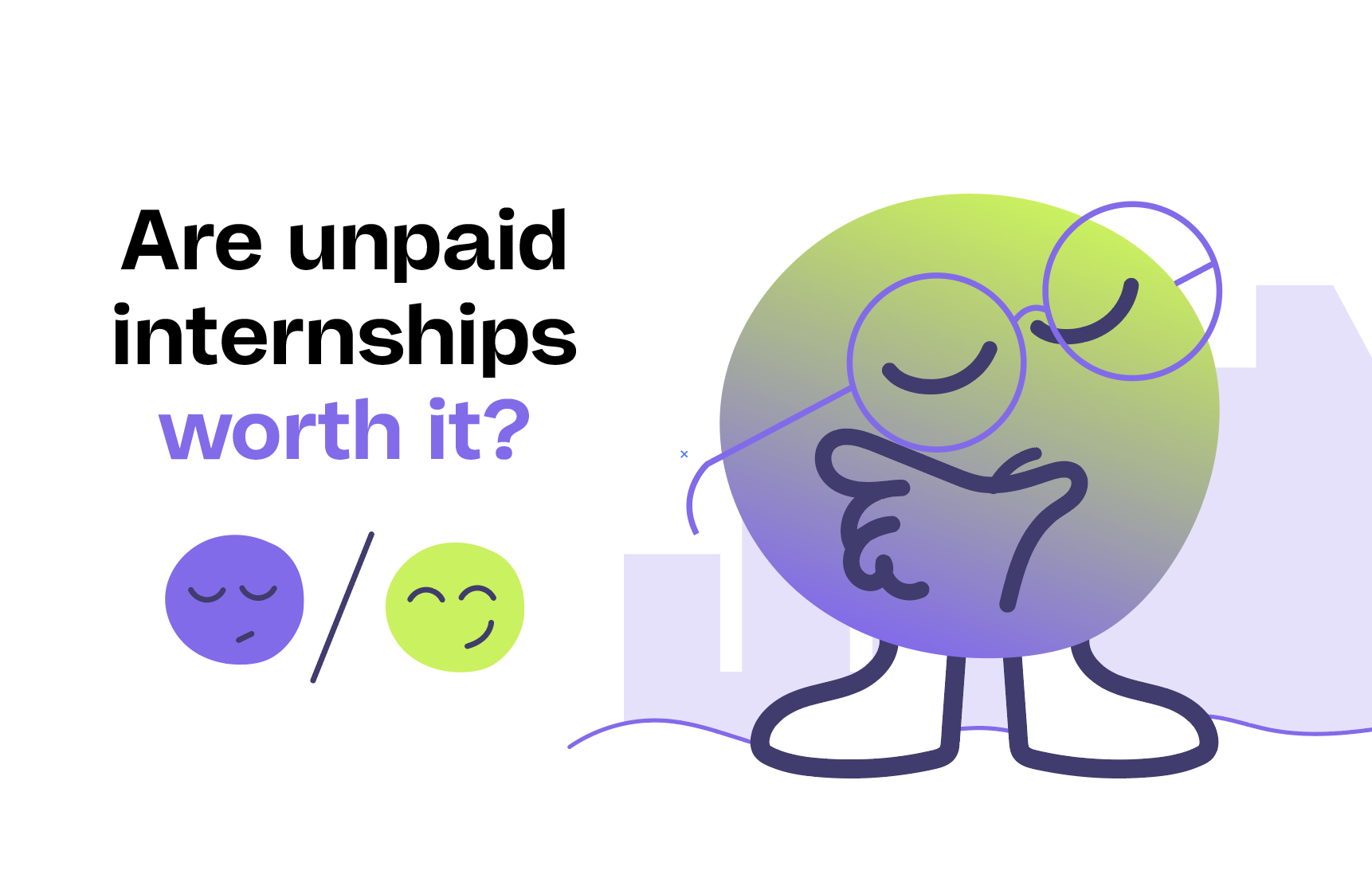
Are unpaid internships worth it? Well, imagine you’re a student or fresh graduate with big dreams, eager to secure your first job and kickstart your career. But as you scan through countless job postings, you notice a common requirement – work experience. Three months. Six months. One year.
How could you possibly have that much work experience without having had a job? That’s when you spot it: “Internship opportunity available”, like a bridge to the next act of your life. It’s in your field of choice, too! But then you see the dreaded words beneath: “Unpaid internship.” What do you do?
Let’s be honest. Unpaid internships aren’t necessarily anyone’s go-to career choice. They’ve long been a topic of discussion, stirring debates about their value, ethics, and the role they play in shaping early careers.
But as the job market grows increasingly competitive, more and more people are struggling to secure the work experience they need to boost their careers. This raises the question, if the experience you need is being offered, should you take one on?
Our very own experts, Capital Placement CEO Vinay and Global Partnership Associate Mandri are more than happy to lend us their insights on everything from industry dynamics to addressing inequalities, and the benefits, drawbacks, and responsibilities involved.
Vinay has over a decade of experience in the internship industry (not including his own multiple internship journeys), and Mandri has placed over 100+ candidates in the past year alone, giving them a holistic perspective on the field and what it takes to excel in it.
Let’s get into it!
The changing face of internships
Firstly, let’s talk a bit about internships as they are and why we take them on. Contrary to what the movies and shows often portray, an intern’s job isn’t just getting coffee and answering calls.

As work itself becomes more diversified, so does the role of the intern.
“Historically, if you attended university, you were almost guaranteed a job. Additionally, it wasn’t very uncommon for our parents, perhaps even our grandparents, to have one job for life. What changed? Well, degrees became more specialised over time and we’ve gone from a couple of dozen different degrees to now hundreds, maybe even thousands of degrees. On the back of that, the type of jobs have changed a lot as well,” Vinay states.
Here’s the easiest way to define it: an internship is a short-term job experience where people can try out what they’ve been studying or what they’re passionate about and see if it’s a viable career path. It acts as a bridge between what we learn through school, university or our lived experiences, and the job market.
“An internship is your introduction to the corporate world. That’s the very first step into it because a lot of us spend all of our youth in school or university. It’s a whole new chapter and it does take some time to adjust into it and transition into it,” explains Mandri.
“So, an internship is a great way to first experience that. And I also think another aspect of why internships are great for you as a professional first step would be the possibility of professional networking, which is highly valuable for career growth,” she adds.
During an internship, you work in a real workplace, learn or improve on useful skills, meet new people, and even help with tasks related to the field you’re interested in. Additionally, there are so many types of internships—from remote to on-site, virtual work experience, part-time internships—addressing different needs for different people.
Okay, but why is it relevant?
Alright, so we know the parameters that define an internship, but what makes them so relevant today?
We discussed how going to university was once enough to guarantee a person a job—often a job for life. But we can’t be so certain of this anymore. A 2020 UNESCO report highlights how over a period of 20 years, higher education gross enrollment rate worldwide almost doubled, going from 19% to 38% between 2000 and 2018.
Graduation rates aside, the growing number of people attending universities amidst turbulent times means that guaranteeing a job for every graduate may not be possible—the global employment divide is growing, too.
The ILO Monitor on the World of Work 11th edition report states: “While global unemployment in 2023 is expected to fall below pre-pandemic levels – to 191 million, corresponding to a global unemployment rate of 5.3% – estimates show that low-income countries remain far behind in the recovery process.
The answer may lie in internships
“An internship is a two-way street. It’s a really good way for you to understand what the workplace is like, to experiment and see different roles before committing to a graduate job. From a company’s perspective, seeing internships on a candidate CV is important. It’s a way for them to de-risk a hire,” Vinay explains.
He adds: “If they have a candidate with prior experience in the role, the company knows they know what they’re doing. They have a tangible portfolio to show. There’s also a lot more competition for jobs, and from an employer’s perspective, practical hands-on experience is preferred over academics.”
But what makes an internship a successful one?
Vinay offers a simple answer: “In every internship—or even at the start of your career—you should be either earning or learning. Ideally, you’d be doing both. If you’re doing neither, it’s not a successful one. It’s time for you to look for new opportunities.”
He’s absolutely right! Since you have the option of choosing your priorities, what happens when you eliminate the “earning” part from your “successful internship”?
The unpaid internship rabbit hole
Unpaid internships are essentially ‘free labour’ at an entry-level position, but there’s more to it than that.
Mandri says, “You work with a company hoping to gain experience or exposure in a specific industry. Maybe it’s your field of study or maybe it’s a field of interest, but you do it without being compensated.”
She elaborates further by explaining that all unpaid internships aren’t created equal—there’s diversity even within them.
Even if you don’t get a fixed ‘salary’ every month, an unpaid opportunity may offer you other forms of remuneration or non-monetary compensation. Sometimes, you may receive stipends to help cover your living expenses.
There could be travel and food reimbursements. Depending on the situation, you may receive (or request) academic credit for completing the internship so that you’re benefiting within and outside the scope of your role.

“Whether it’s a paid or unpaid internship,there are lots of benefits to taking one on. We spoke about how things are becoming more specialised, more niche as time goes on, and gaining that specialised experience as a young adult or as a graduate is crucial. It’s not even just about getting the exposure within your skill but also learning how the corporate world works—learning how to navigate in that environment is something you can start with an internship,” add Mandri.
Of course, between paid and unpaid internships, there’s no question as to which is ultimately more beneficial—if your goal is to earn. But for those who’re intent on building a career in a particularly competitive field, unpaid internships may be your best option. Ultimately, it comes down to your highest priority.
This doesn’t mean we’re going to ignore the drawbacks of unpaid opportunities.
How common are unpaid internships?
Good question! Unpaid internships are super common, despite the target group being almost entirely made of people who are … usually very broke?
Sometimes, it comes down to how competitive the industry itself is, with certain industries having far more unpaid interns than others.
“The fashion industry being one of probably the best examples of an industry that tends to pave by experience. Industries like fashion, entertainment, publishing and media are all industries where you have to learn a specific skill from a specific type of person,” states Mandri.
She continues, “Combined with the amount of competition in these industries as well, means it’s not something you can just study and then excel in. You need that real-life experience and direction. You need that guidance. For those reasons, there’s a lot of tough competition in specific industries.” Over time, this has become the expected standard in these industries, with unpaid internships entrenched deep within.
In other cases, it comes down to the type of organisation, where paying interns is not the problem. It’s often that these employers are simply not in a position to pay.
“In my experience, a vast majority of employers who can afford to pay, will pay,” Vinay explains. “It’s often the case that employers can’t afford to pay for various reasons. They could be a nonprofit, they could be a very early-stage startup.
Why do NGOs constantly offer unpaid roles?
“With NGOs, a bulk of the money needs to be prioritised for the beneficiaries as opposed to overheads. Most charities and NGOs around the world have to disclose what percentage of their donations is going towards overheads and what goes directly to beneficiaries. This has a knock-on impact in terms of future donations that they may receive. They want to keep overheads to a minimum as much as they can, which is why unpaid internships are so common in that sector.”
Another major factor is an imbalance in supply and demand. “Certain industries generally tend to have a lot of supply and not much demand for roles. Let’s take the classic example of fashion. Most major brands have one or two lines per year or per season. Often, if you’re looking at designing, etc., it’s often a very senior designer. Often the name of the designer goes as the brand name, and the opportunity to kind of create those kinds of things is very limited,” Vinay elaborates.
He goes on to say that to create or work under a fashion brand is often very limited. There’s a huge supply of talent but the demand to hire them is relatively minimal. Due to this, a lot of fashion brands, unfortunately, do not pay.
Further, the perceived nature of work could be an additional reason. As Vinay states, “If the internship in itself is not very meaningful to the company, the first question you might ask is, ‘why would a company take on an intern on a case by case basis?’ It could be because the government requires them to hire interns.”
Before you wonder “Who’s going around handing out free internships?”, let me clarify that it’s surprisingly more complex than that.
In certain countries in the world where the government strongly encourages local businesses to hire interns from the local universities, or students to do an internship in order to graduate. In these countries or regions, it’s very common to do internships and the quality of those internships could be perceived as quite low and of much value to an employer. This could be contributing to why employers don’t want to pay their interns or prefer to pay below what the intern should ideally be getting.
But we now know for certain that a coffee run isn’t all an employer’s expecting from their intern, right?

So, how do we address inequality in unpaid opportunities and ensure the intern walks away with a fair deal—as fair as it gets, anyway?
(P.S., The unpaid internship rabbit hole runs deep! If you’re interested in learning more, we’ve got a more elaborate history of unpaid internships on our blog.)
Addressing inequality
The biggest problem with unpaid internships is that the world is rife with inequality to begin with. When we consider the fact that a lot of internships are unpaid or very low-paying, we must also think about the people who end up taking on these roles.
A lot of people who take on those internships come from poorer households or are marginalised people who don’t have a lot of options for them in terms of work. When discussing if these criticisms were warranted, we had to think deeply about intersectionality. Inequality from one source often seeps into other issues, like class, gender, disabilities, race, etc. When it comes to internships, whether the inequality is the cause or the symptom is a tough topic to seal.
Unpaid internships place a tremendous financial burden on students and their families. Since they don’t earn any income during the internship, they may struggle to pay for basic living expenses such as housing, food, and transportation. This can lead to financial strain and even debt, as students might need to take out loans or rely on family support to cover these costs.
Additionally, influential people often get opportunities to study and/or work through their connections. So, in no uncertain terms, we all agreed that these criticisms were warranted and should be acknowledged on a much larger scale.
Students and recent graduates are, as we mentioned before, already a relatively low-earning group. But there’s a difference between being ‘broke’ as in you can’t afford a night out and being broke as in you can’t pay the electricity bill. The latter is, without a doubt, far worse.

Vinay touches on the broad discourse, providing some much-needed context: “If you come from a middle-class or upper-middle-class background, or your parents can afford to send you to a good school or university, they pay for your expenses—all of that is a luxury that a lot of students and recent graduates do not have.
“Soon after these students finish their degree, there is an immediate pressure to earn. For those candidates, they miss out on some of these internship opportunities or their opportunity to progress their career and instead they have to work or get a job that pays and that’s their number one priority. This creates a natural inequality because people who can afford and have the luxury of doing an unpaid internship do often win in the long term.”
Often the candidates that can’t afford to or don’t have the luxury of doing an unpaid internship get left behind. So, what happens to them?
The vicious cycle
“There was a really interesting study that was done during the financial crisis the last time around. They surveyed classes from 2007 to 2008 that graduated and they lifted the outcomes for those candidates five years later compared to candidates that graduated in 2009 and 2010. For the candidates that graduated in 2009 and 2010, the actual career trajectory for them five years later was far, far steeper than candidates who’d graduated a year prior,” Vinay says.
Turns out that the reason was, when they graduated and they entered the job market, they often ended up immediately working in retail or in hospitality, and wound up in endless cycles that were impossible to break free from. The gruelling, hectic hours don’t make anything easier, either.
“If you work in a restaurant or in a retail store for a year, it’s very difficult for you to make job applications because you’re working long hours and you don’t have that time sit down and research an employer, you don’t have time to put together a compelling application, or to go for interviews, etc., because you have to focus on paying your bills at the end of the month,” Vinay added. Meanwhile, candidates who graduated a year later—and when the companies were hiring—had it much easier.
Privilege and luck clearly play a huge role in determining people’s career paths, but that doesn’t mean you HAVE to settle.
Make the most out of an unpaid opportunity
So, you have no choice but to take on an unpaid opportunity in a field of your choice. What now?
Unpaid interns can still utilise the opportunity in a plethora of ways for their own wellbeing—to realise their own goals. Knowing how to make the most out of it will definitely translate into more benefits for you.
Why? When it comes to your career growth, you’re taking the lead.

To begin, Mandri suggests analysing if an opportunity aligns with your career goals and understanding how to maximise the benefits you take away from it. Start off by writing out your own personal development plan. It’s quite easy (and fun to do). Once you know your strengths and weaknesses and your career priorities, it becomes easier to see if an opportunity will provide you with what you need to continue growing in the direction of your choice.
“If you want to specialise in something very particular, look for smaller companies where you’ll be working very closely with the core team. In larger companies, you could get rotated around, across departments, and receive a more holistic industrial perspective,” she adds. “You actually get a perspective that most people aren’t privy to.”
“Additionally, building your professional network is key. You have to start somewhere, and I would say that internships are the easiest way. It could be just connecting with people that are in your industry—or leaders in the industry, but it also could be about finding a mentor, learning from someone. At the end of the day, whether we’re newbies or we’ve had five years or 10 years of experience, it’s always best to ask for help and to ask that from someone who knows the background or the direction you’re going in better than yourself,” Mandri explains further.
Sure, there are countless ways to impress in the workplace and turn a difficult situation into a winning one for you.
But that doesn’t quite answer the question …
So, are unpaid internships worth it?
Unfortunately, as we’ve explored, the answer isn’t straightforward. Internships, even if unpaid, still offer invaluable experiences that money can’t buy.
From learning punctuality and consistency to building vital connections and mentorships, unpaid internship benefits extend beyond financial compensation. Viewing an unpaid internship solely through the lens of money might cause you to overlook the rich experiences it can provide.
However, being pragmatic is essential. The value of an unpaid internship should be measured against your career goals and personal circumstances. Imagine having to choose between an unpaid opportunity aligned with your passion and a paid one in a different field. The decision becomes complex, hinging on the alignment of the opportunity with your goals.
Ultimately, the worth of an unpaid internship is determined by a combination of factors: the quality of the internship, your financial situation, and the career prospects it offers. While we advocate for seizing valuable opportunities, we also recognise the need for balance. In fact, if a paid internship that aligns with your goals, that’s always the right choice.
In the end, the decision rests in the hands of the intern, with consideration for the opportunities presented and the path they envision for their career. So, are unpaid internships worth it? The answer varies, but with the right mindset and careful evaluation, any internship can contribute to your growth and pave the way for a successful future.



